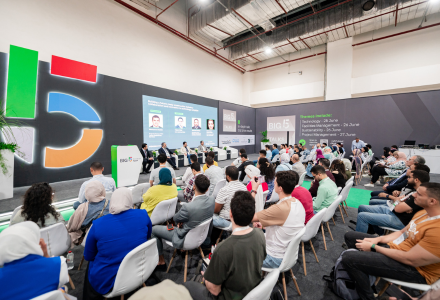
HELD UNDER THE PATRONAGE OF HIS EXCELLENCY DR MOUSTAFA MADBOULY, PRIME MINISTER OF THE ARAB REPUBLIC OF EGYPT
- The event is held under the patronage of His Excellency Dr. Mostafa Madbouly, Egypt’s Prime Minister
- Egypt’s construction industry is projected to grow at a CAGR of 8.39% through 2030, supported by major government investments directed towards mega projects
- Co-located with the 3rd edition of Egypt Infrastructure & Water Expo, the event features exhibitors from more than 20 countries

Cairo, Egypt | 26 May 2025: Egypt’s construction sector is on an upward trajectory, currently valued at $570 billion and expected to grow at a CAGR of 8.39% between 2025 and 2030 (Source: ABiQ, Mordor Intelligence). Backed by a $400 billion infrastructure market, the sectors’ momentum is aligned with Egypt Vision 2030 and the National Strategic Plan for Urban Development, both of which prioritize sustainable infrastructure and smart urban expansion (Source: ABiQ). Supporting this growth, the seventh edition of Big 5 Construct Egypt will take place from 17-19 June 2025 at the Egypt International Exhibition Center (EIEC) in Cairo.
Held under the patronage of His Excellency Dr. Mostafa Madbouly, Egypt’s Prime Minister, the event is co-located with the third edition of Egypt Infrastructure & Water Expo.
“Year after year, we see the growing impact of Big 5 Construct Egypt and Egypt Infrastructure & Water Expo in shaping industry conversations, strengthening connections and accelerating project delivery across the country by fulling the industry’s sourcing needs. As Egypt expands its infrastructure and urban ambitions, these events promote knowledge exchange and spark cross-sector collaboration, contributing to a more sustainable and resilient future for the sector,” said Josine Heijmans, Senior Vice President – Construction, dmg events.
Local and international exhibitors strengthen sector growth
This year, attendees will have access to over 350 exhibitors from more than 20 countries, including China, Germany, Italy, Saudi Arabia, Türkiye, India, the UAE, France and more. The event brings together leading local and international suppliers across a wide range of construction, infrastructure and water segments, from building materials and digital construction to MEP services, water and smart city solutions. Key exhibitors include Bosch, a global leader in power tools and accessories; Trimble, known for its technology solutions that bridge the physical and digital worlds; and Beam, a specialist in sustainable interior and exterior systems.
Running alongside Big 5 Construct Egypt, Egypt Infrastructure & Water Expo focuses on critical infrastructure and utilities segments, including urban connectivity, communications, water and wastewater solutions. Exhibitors at the expo include major players like Odoo Middle East, known for offering the best professionals in technical and functional knowledge; Veolia Water Technologies, a global leader for water and wastewater treatment solutions; and Zhongding International Construction Group, China-based construction, infrastructure and engineering leader.
The expo’s focus on infrastructure has made it a key destination for companies involved in delivering essential transport, water and urban development projects.
CPD-certified sessions promote fresh thinking and professional growth
Big 5 Construct Egypt and Egypt Infrastructure & Water Expo will feature a number of CPD-accredited learning opportunities for professionals, offering direct access to market trends, government insights and practical strategies from experts across the construction and infrastructure value chain.
At Big 5 Talks, attendees will benefit from insightful panel discussions, case studies and more across five core themes: facilities management, project management, technology, sustainability and leadership. Prominent speakers, including Dr Raymond Ahdy, Chief Executive Officer, Wadi Degla Developments; Eman El Garhy, IFC Consultant & EDGE Expert; Tarek El-Sheikh, Director, The Urban Institute; Eng Tarek ElGamal, Chairman, Redcon Construction; and Ahmed Kamal, Executive Director of the Environmental Compliance Office and Sustainable Development, among others will share actionable insights addressing industry needs, supporting the growth of the construction sector.
Meanwhile, Egypt Infrastructure & Water Expo will host CPD-certified Infra360 and Water360 sessions led by thought leaders and policymakers. These discussions will focus on smart infrastructure, water efficiency, urban resilience, public-private partnerships and project delivery excellence, featuring Dr Medhat Abdel-Mooty, Consultant Engineer, The Holding Company for Water and Drainage – Alexandria (AWWCO); Prof. Karim Eldash, Vice President of Benha National University, Benha National University; Dr Omar Elhosseiny Elnady, Director, Consultant & Associate Professor of Environmental Engineering, Coventry University; Eng Noha Salah Mahmoud, Urban Planning & Sustainable Development Expert | Project Execution Manager, Industrial Development Authority; and Dr Essam Shabaan, Chief of Party, Centre of Excellence for Water - USAID Egypt, among others.
Big 5 Construct Egypt and Egypt Infrastructure & Water Expo are free-to-attend for trade and industry professionals over 18. To register, visit: www.big5constructegypt.com | www.egyptinfrastructureexpo.com
– ENDS –
For media queries contact:
Ranju Warrier, Head of Communications – Construction, dmg events
Khushie Mallya, PR Executive – Construction, dmg events
Abdulrahman Dabaa
abdulrahman.dabaa@excellentdandn.com | +20 10 90227959
About Big 5 Construct Egypt
Big 5 Construct Egypt is back in its 7th edition, from 17-19 June 2025 at the Egypt International Exhibition Centre (EIEC) in Cairo. It is the largest and most influential construction industry event bringing together local, regional and international construction and infrastructure community in Egypt.
With a focus on delivering value to attendees, Big 5 Construct Egypt provides an unrivalled opportunity to discover the latest products and services, compare and evaluate them and make informed purchasing decisions. The event brings together leading suppliers, manufacturers and distributors to showcase their innovative solutions in building materials, machinery, equipment, software and more. Big 5 Construct Egypt is a part of Big 5, the largest portfolio of construction events in the world.
Admission is free for pre-registered trade and industry professionals. To know more, visit www.big5constructegypt.com
The Egyptian capital witnessed the signing of nine concessional financing and grant agreements worth €262.3 million between the Egyptian government, France, and the European Union. The agreements were signed during the state visit of French President Emmanuel Macron to Egypt and his meeting with President Abdel Fattah El-Sisi. These agreements aim to implement high-priority development projects in vital sectors such as water, sanitation, renewable energy, and railways.
Two Additional Agreements to Deepen Cooperation
Minister of Planning and International Cooperation Dr. Rania Al-Mashat signed two additional agreements with the French side in the presence of both presidents, aimed at renewing technical and financial cooperation. These agreements will support four priority projects that contribute to infrastructure and economic development, while enhancing technology and human development sectors.
“Alexandria Regional Control Center” Project
Two agreements were signed to fund this project through €50 million in concessional financing from the French Development Agency (AFD) and a €10 million grant from the European Union. The project aims to improve the quality and stability of electricity supply in Alexandria Governorate and modernize the network's control systems, in line with Egypt's ambition to become a regional energy hub.
“New Wastewater Treatment Plant in East Alexandria” Project
This project is funded by €68 million from AFD and a €2 million grant. It aims to expand wastewater treatment capacity to serve 1.5 million people, with a processing capacity of up to 300,000 cubic meters per day, thereby supporting urban development efforts in Alexandria.
“Railway Line Linking Robeiky/10th of Ramadan/Belbeis” Project
The project is financed with €70 million from AFD and a grant of €800,000. It aims to improve the transportation sector by facilitating cargo movement between industrial zones and dry/sea ports. This will help reduce costs and time, boost industrial activity, and create new job opportunities.
“Gabal El Asfar Wastewater Treatment Plant” Project
This project includes €50 million in financing and two grants totaling €11.5 million. It aims to enhance the capacity of one of Egypt's largest wastewater treatment plants, to accommodate population growth and improve the quality of sanitation services.
A Shared Strategic Vision
Dr. Rania Al-Mashat affirmed that these agreements reflect the strength of the partnership between Egypt and France, especially after upgrading their relations to a strategic partnership. She noted that further consultations will take place to determine priorities for future projects, with French funding directed toward sustainable development in areas such as infrastructure, climate, education, and technology.
These projects represent a successful model of international cooperation and directly contribute to Egypt's efforts to achieve sustainable development through effective partnerships with France and the European Union.

France has pledged around €4 billion ($4.39 billion) to support Egypt’s development, including €3.5 billion for public sector projects, $500 million for private sector investment, and €12.6 million in development grants. The French Development Agency (AFD) is also managing €150 million in EU-funded grants for key sectors like infrastructure projects, renewable energy, public transportation, and housing.
The announcement coincided with President Emmanuel Macron’s visit to Egypt, reflecting growing bilateral cooperation since President Abdel Fattah El-Sisi took office in 2014. The current Egypt-France development portfolio stands at €1.5 billion, with joint projects in energy, green transition, and infrastructure—including the Greater Cairo Metro and Abu Qir Metro.
France remains one of Egypt’s top European trading partners, with bilateral trade rising 14.7% to $2.9 billion in 2024. French companies are also expanding investments in energy, transport, and retail sectors, supporting Egypt’s long-term growth.

Egypt and Spain Sign Grants to Support Water Treatment and Create Job Opportunities for Youth
Egypt's Minister of Planning Rania El-Mashat and the Spanish Ambassador in Cairo signed two grants worth €800,000 to support development in Egypt. The first grant, €500,000, will support a wastewater treatment project in sugar factories, while the second grant, €300,000, aims to create job opportunities for youth and promote entrepreneurship. El-Mashat emphasized the importance of these partnerships in achieving sustainable development goals and improving water security, while the Spanish Ambassador highlighted Spain's commitment to supporting Egypt in various sectors.
Abdel Fattah El-Sisi: Localizing the Production of Water Desalination and Recycling Equipment is a Priority for Egypt's Industrial Growth
President Abdel Fattah El-Sisi emphasized that localizing industry in Egypt includes investing in the production of water desalination and recycling equipment to support national projects. During his meeting with international companies at the third industrial forum, he highlighted the importance of stimulating the industrial sector, supporting small and medium-sized industries, and enhancing the investment climate. He also focused on strengthening partnerships with the private sector to increase local content in production. Company leaders commended the Egyptian government's efforts to improve the investment environment and provide incentives for investors.
Government Approves 12 Private Sector Partnership Projects in Water and Electricity Sectors
The government has approved the initiation of 12 partnership projects with the private sector in the fields of water, sewage, and electricity. The projects include the right to utilize electricity networks in several areas such as 10th of Ramadan and New October City, along with transformer station projects in Sheikh Zayed, New Mansoura, and 6th of October. The projects also include a water purification station in Mostorod and sludge treatment plants in various areas. These projects aim to enhance the private sector's contribution to economic development and create job opportunities.

Engineering exports recorded $3.9 billion during the first nine months of the current year, compared to $3.1 billion during the same period last year, achieving a growth rate of 25.6%.
According to the monthly report issued by the Engineering Export Council, exports in September reached $446.2 million, compared to $387.7 million in September 2023, marking an increase of 15%.
Cables led the sector's exports, achieving a growth of 33.6% during the first nine months of the year, followed by electrical and electronic industries, which grew by 9.3%.
Sharif El-Sayed, Chairman of the Engineering Export Council, stated that the council aims to achieve exports worth $5.25 billion by the end of this year, with expectations of increasing this figure to $6 billion by 2025.
He added that the council’s plan targets an annual growth rate of no less than 20%, aiming to boost the sector's contribution to achieving the state’s export goals by 2030.
Source: Alborsaa News

Prime Minister Dr. Mostafa Madbouly has approved the allocation of 97.12 acres of state-owned private land in the East El-Montazah area of Alexandria Governorate. The land is designated for the construction of seawater desalination plants, supporting the state’s strategic plan to expand such projects in partnership with the private sector by 2050.

Eng. Khaled Abbas, Chairman and Managing Director of ACUD, signed a Memorandum of Understanding with Avnash Iyer, Country Head of DP World Egypt, to explore the development of a new general free zone within ACUD’s designated lands.
The agreement was formalized during a ceremony at the New Administrative Capital’s government headquarters, attended by Prime Minister H.E. Dr. Mostafa Madbouly and Deputy Prime Minister for Industrial Development and Minister of Industry and Transport, Lt. Gen. Kamel El-Wazir. This zone is poised to become a major construction and manufacturing hub, with plans to establish factories for electronics, automotive production, FMCG goods, as well as textiles, footwear, and apparel across approximately 500 acres within ACUD’s allocated lands. Positioned strategically along the Cairo-Ain Sokhna road, the site features a prime 1,958-acre industrial infrastructure area that will serve as a cornerstone for ACUD’s vision of creating an advanced industrial ecosystem.
This MoU supports ACUD’s strategy to promote diversified land use, advance fourth-generation industrial zones, and provide essential infrastructure to fuel Egypt’s growing construction and manufacturing sectors. Technical and economic studies will soon be underway, setting the stage for final contracts and the official launch of the free zone.

Egypt ranks second among African countries in infrastructure improvement, following Morocco, with Mauritius, Algeria, Seychelles, Tunisia, Libya, Kenya, Botswana, and South Africa also in the mix.
African countries have made progress in energy, transport, and technology through partnerships between governments, international institutions, and investors. Institutions like the African Development Bank, World Bank, and China play a key role in financing projects focused on sustainability and renewable energy.
However, Africa faces immense infrastructure demands, with the African Development Bank estimating a need for $130-170 billion annually. Yet, there is a funding gap of up to $100 billion affecting vital sectors such as energy and transport. The World Bank indicates that Sub-Saharan Africa needs to invest 7.1% of GDP annually to achieve sustainable development goals, while current investments are only about 3.5%.








